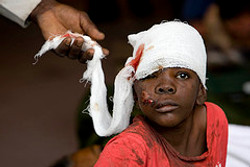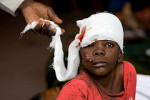
For six days now, Port-au-Prince, the capital of Haiti, has been in utter chaos after the violent earthquake, with a magnitude of 7 on the Richter scale, that hit it. A large number of buildings have collapsed. Thousands of bodies are strewn across the streets. In response to this disaster, many organizations are mobilizing to help a state in distress.
The Catholic Relief calls for donations, only financial ones. Its uniqueness? It operates within the Caritas Internationalis network. One hundred sixty-four Caritas organizations exist worldwide. They share the same mission as Catholic Relief: to support the most impoverished. “In emergencies, the collected funds are sent to the Caritas according to their needs,” says Michel Fraisse, Departmental Director of Catholic Relief. Haiti, of course, has its own Caritas. “With this system, we avoid funds being siphoned off due to corruption.”
Meanwhile, the departmental delegation of the Red Cross of Alpes-Maritimes sends the donations it receives to the central headquarters in Paris. People who have made contributions will be given a tax receipt. The French Red Cross, working with the International Red Cross, “will transfer the money to Haiti as needed,” specifies Sylvie Demangeat, President of the Vence delegation of the Red Cross. “We always work in consultation with the country,” she adds.
Money yes, but for what purpose?
Before knowing how the donations will be used, the Haitian Caritas must conduct an assessment to determine different needs. Michel Fraisse then makes some assumptions: “For the moment, it’s likely that there will be an urgent phase, which means putting people under shelter, allowing them to sleep under a roof, to feed themselves, to have clothes for those who have lost everything.” “Then will come the reconstruction phase. Once people’s lives are secured, we need to rebuild houses, enable craftsmen to have tools again, etc.”
For the Red Cross, the priority is “to evaluate the people who are in need, to give them a certain amount so they can restart, provide them with purchased equipment, recycle water to make it drinkable,” reports Sylvie Demangeat. “Then we assess the damage accordingly. We will first rebuild schools and centers and gradually some houses. This takes years,” she continues. Years for the state to restore its original appearance. As for the souls, they are forever scarred…


